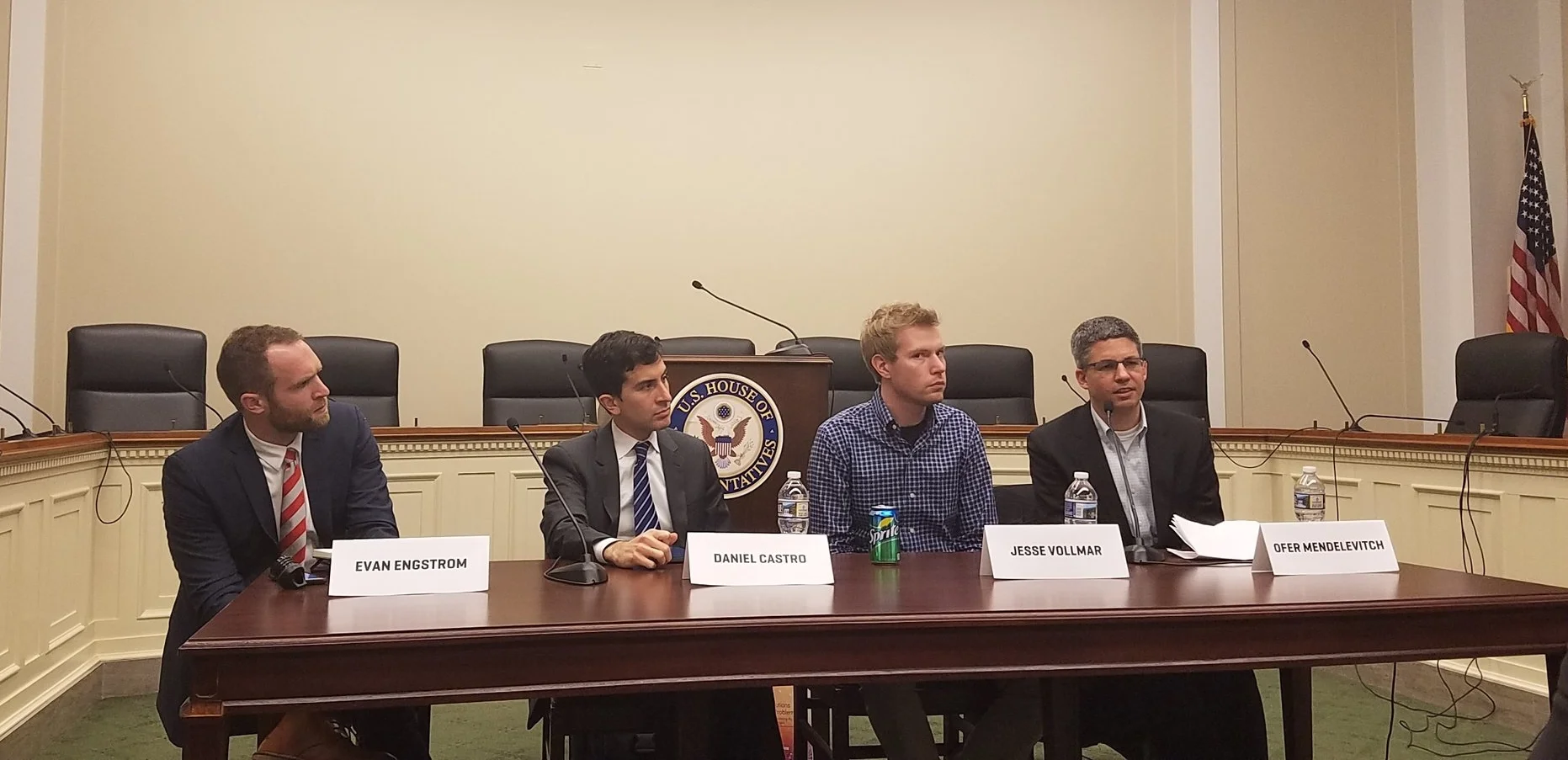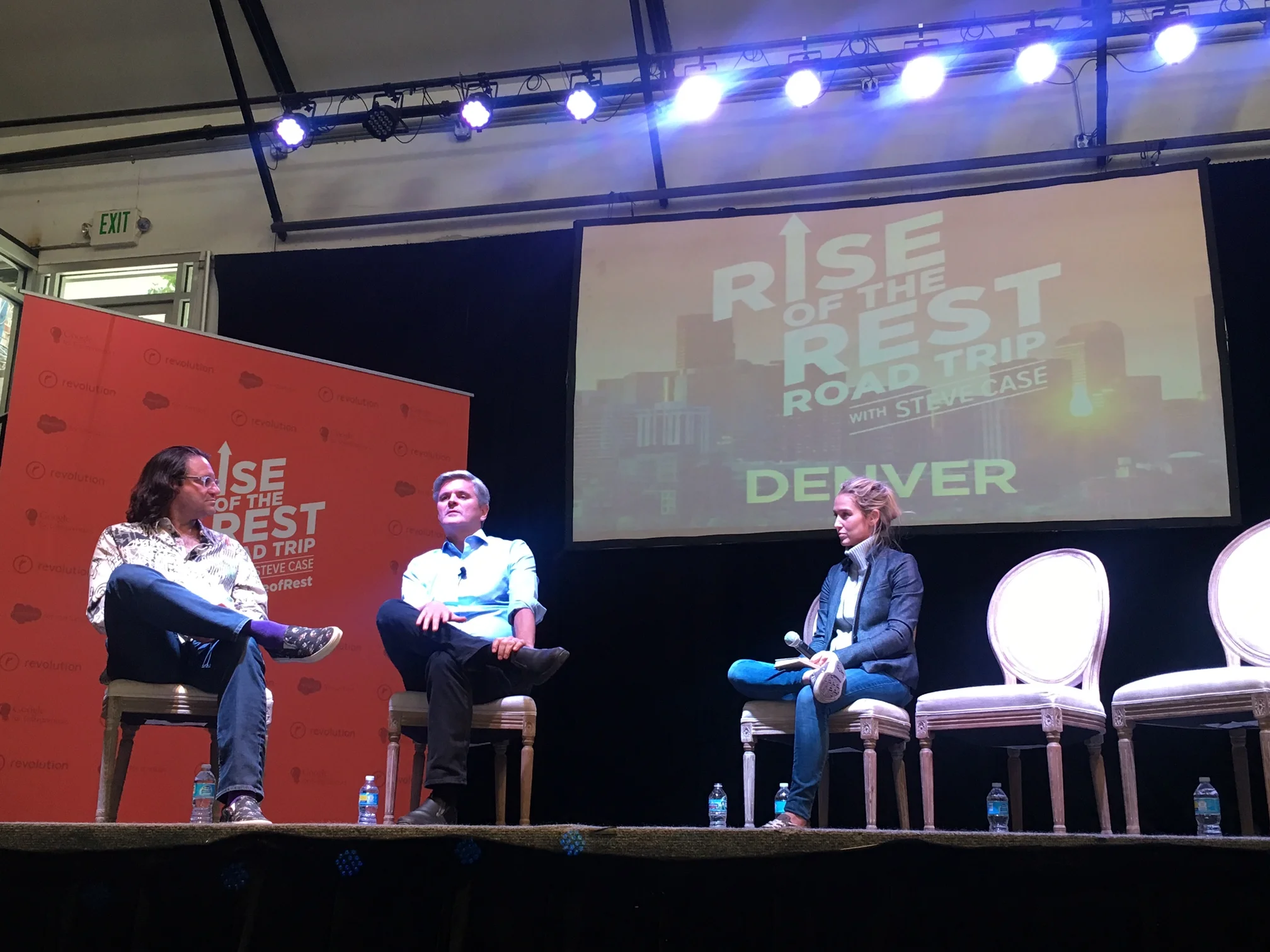Startups from around the country came to D.C. last week to tell lawmakers about the need for an open Internet.
Historic day of action for Net Neutrality breaks records
HBO’s ‘Silicon Valley’ tackled an issue that’s all too familiar to startups: The threat of frivolous patent litigation
Event Recap: Private Solutions for Public Problems
Earlier this month, Engine held its first briefing of the year: a conversation around the ways that startups are harnessing big data to drive innovation and develop targeted solutions for some of society’s greatest challenges. The event was headlined by Reps. Blake Farenthold (R-TX) and Derek Kilmer (D-WA), who were joined by a distinguished panel of startup leaders and policy analysts.
In Apple v. Samsung, SCOTUS Sided With Reason Over Rounded Corners
After almost five years of legal volleying, the U.S. Supreme Court finally issued a decision in the highly anticipated Apple v. Samsung design patent case late last year. On Tuesday, Dec. 5, the court delivered a unanimous decision in favor of Samsung, finding that damages for design patent infringement may be limited to revenues attributable to a component of an article of manufacture rather than profits from the entire article. While this is an important victory for startups and innovators—from global corporations to inventors toiling in garages—courts must still work to provide the guidance and clarity necessary to prevent bad actors from abusing the patent system to the detriment of innovation. And they have a new opportunity to do so: On Feb. 7, the U.S. Court of Appeals for the Federal Circuit took a significant step in that direction by remanding the Apple v. Samsung case to the Northern District of California court.
So How Many Patents Are in a Smartphone?
The Supreme Court’s December 2016 decision in Apple vs. Samsung reversed a dangerous lower court decision that would have allowed patent plaintiffs to claim the total value of a product containing an allegedly infringing design feature, even if that design feature only provides a small amount of the product’s value. While total profits awards may arguably have been more plausible in an age when devices were less complicated and the design of the object constituted a significant portion of its value, the complexity of modern devices renders total profits awards for design patent infringement particularly illogical.
One Way to Protect Startups from Patent Trolls? Get Rid of Bad Patents.
The patent system was established by our founding fathers as a tool to promote innovation and invention. But too often, America’s most creative, forward-thinking startups find themselves interacting with the patent system in a less-than-ideal way: on the receiving end of an infringement suit or a letter threatening as much. Bad actors that have amassed hundreds and thousands of overbroad, low-quality patents (colloquially known as “patent trolls”) target businesses, using these patents as proverbial weapons with the goal of forcing companies into costly settlements.
Five Years Later: What the SOPA/PIPA Protest Meant for Tech
Considering tech’s strong presence in DC politics, it’s hard to believe that half a decade ago, the notion that the internet community was capable of any unified political engagement seemed far-fetched. But exactly five years ago today, the nation’s political apparatus quickly came to understand just how powerful a constituency the internet community could be.
Our Take on the Final International Entrepreneur Rule
On Friday, the White House released an advance copy of its final International Entrepreneur Rule, which will allow qualifying foreign entrepreneurs to build their startups in the U.S. The final rule will be published in the Federal Register today and will become effective on July 17, 2017.
Broadband choice for the Bay Area
Engine made its home in the Bay Area for a number of reasons, the top being its proximity to some of the most creative and innovative companies in the United States. Home to tens of thousands of startups, it’s a tech haven with a rich talent pool, access to capital and seemingly endless disruptive ideas.
Training the Next Generation of Tech Talent
Computer Science (CS) Education Week is an annual initiative that aims to get kids excited about computer science and inspire interest in technology careers—an effort that is more important now than ever. It’s no secret that demand for computer science professionals has skyrocketed in recent years. Virtually every industry has an increasing need for STEM workers, especially those with a background in computer science and coding. And yet, there is a growing gap in the availability of these skilled individuals. There are currently over 500,000 open computing jobs nationwide, but last year, only 42,969 computer science students graduated into the workforce. In fact, there are fewer students graduating with degrees in computer science today than there were ten years ago. Our workforce is woefully unprepared to meet the growing demand for IT professionals.
Tech Leaders Send Letter to Donald Trump
On Wednesday, Engine’s Executive Director Evan Engstrom and sixteen other technology industry leaders sent a letter to President-elect Donald Trump outlining a number of growth and innovation-driving principles that he should consider as he sets his policy agenda.
Engine Urges Congress to Pass Stock Options Legislation
On Tuesday, Engine joined over 80 startups and entrepreneurial ecosystem leaders in urging Congressional leadership to include the Empowering Employees through Stock Ownership (EESO) Act in any legislative vehicle Congress plans to pass before the end of 2016.
Bringing Broadband Choice to San Francisco
Engine chose to make its home in the Bay Area to be close to some of the most creative and disruptive companies in the country. A place where an innovative internet service provider like Monkeybrains could crowdfund the deployment of gigabit wireless service. Or where a provider like Webpass could build an entirely wireless infrastructure, using super high spectrum frequencies to deliver the fastest internet in the city.
Engine Applauds International Entrepreneur Rule, Recommends Additional Improvements
At Engine, we’ve seen firsthand some of the extraordinary contributions that immigrant entrepreneurs have made to the startup economy. One-third of U.S. venture-backed companies that went public between 2006 and 2012 had at least one immigrant founder. Moreover, immigrant entrepreneurs started, in whole or in part, some of the most important technology companies of our time, including Google, Intel, Yahoo!, eBay, and WhatsApp. In fact, the United States was home to almost 2.9 million foreign entrepreneurs who generated $65.5 billion in business income in 2014.
Making It Bigger in Denver
With a population of almost 3 million (that is growing by 100,000 every year), ten Fortune 500 companies, and a strong network of regional universities, it may be unfair to call Denver a city on the rise. However, Denver residents will be the first to recognize that the city’s environment for early stage entrepreneurs and startup innovation is continuing to develop and there is still a lot of room for the city to grow. The Rise of the Rest tour, with Steve Case at the helm, spent its second day on the road in Denver to learn from the successes and challenges of the ecosystem and inspire the wider business, policy, and educational leaders in the area to support its many entrepreneurs.
Engine Joins Election Day Off and #FreeRideToVote
Banging the Drum in Omaha and Lincoln
In the 1860s, the First Transcontinental Railroad was constructed, connecting Omaha, NE to Sacramento, CA. It was fitting, then, that we kicked off Rise of the Rest’s western tour with a symbolic visit to to Lauritzen Gardens, the original site of the railway. While the rail line was one of Nebraska’s earliest “startups,” today there is a new startup scene taking hold in Omaha and Lincoln—one fueled by growing investment, exceptional local talent and ideas, and a unique culture around support and community.
Continuing the Startup Community’s Fight for Balanced Copyright
As a non-profit policy organization committed to making the world better for startups, Engine has a long history of engagement on copyright reform issues. Indeed, Engine began as an effort to harness the political power of the startup community that emerged from the tech world’s fight against the ill-fated SOPA/PIPA copyright bills. While the SOPA/PIPA battle remains a critical milestone in the emergence of tech as a political force, our work to return copyright law to a system that promotes rather than hinders innovation is only beginning. To help further this crucial mission, we are proud to join the Re:Create Coalition, a group of creators, innovators, and users working to ensure that copyright laws are balanced and foster innovation, creativity, and economic growth.
Let’s Make It Easier for Startup Employees to Exercise Their Options
Equity compensation, often in the form of stock options, is a critical tool used by startups to attract, retain, and incentivize quality employees. But stock options have a downside: current tax law requires that employees pay an immediate tax when they exercise their options, usually long before they can sell those stocks to realize their full economic value. Fortunately, a bill being considered today by the House Ways and Means Committee could remedy this problem.

























